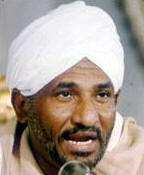Former PM Mahdi welcomes new Sudan constitution
KHARTOUM, July 10 (Reuters) – Former prime minister and opposition politician Sadiq al-Mahdi welcomed Sudan’s new presidency and constitution as a step forward but said on Sunday there were still many hurdles to overcome to create democracy.
 Former southern rebel leader John Garang was sworn in as first vice president on Saturday and a new constitution was adopted, following a January peace deal to end more than two decades of civil war in Sudan’s south.
Former southern rebel leader John Garang was sworn in as first vice president on Saturday and a new constitution was adopted, following a January peace deal to end more than two decades of civil war in Sudan’s south.
“We regard the constitution as a step forward from the 1998 constitution but it cannot claim that there is a comprehensive agreement because it is not comprehensive,” Mahdi told reporters in Khartoum.
Sudan’s last democratically elected leader, Mahdi leads the Umma party, widely believed to be the largest political party in the country.
He says the peace deal and the new constitution were agreed between Garang’s Sudan People’s Liberation Movement (SPLM) and the ruling National Congress Party (NCP), leaving many of Sudan’s major political parties without a say.
The SPLM argues the constitution can be changed after democratic elections, due to be held within 3 years according to the deal.
The January deal provides for power and wealth sharing between the north and south, a new coalition government and a southern referendum within 6 years on secession from the north.
But Mahdi said the percentages of power sharing outlined in the deal and mirrored in the constitution were unrepresentative.
The deal gives the NCP 52 percent of government and parliament, the SPLM 28 percent and northern and southern opposition parties the remaining 20 percent.
“The National Congress Party doesn’t represent all of the north and the SPLM does not represent all of the south,” Mahdi said.
He also criticised the constitution for outlining regulations for political parties.
“A constitution does not represent the interests of parties, it represents the unanimity and opinion of the nation,” he said. “This is an unwarranted kind of representation in the constitution.”
He also said the constitution, while requiring there be international monitors for the southern referendum on secession, did not make the same provision for the elections.
But he said the constitution was better than the previous one.
“It’s better because it … says that all human rights in the international charters are part and parcel of the constitution,” he said.
